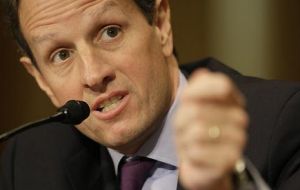MercoPress. South Atlantic News Agency
Obama administration unveils regulatory framework for financial system
 Geithner:
Geithner: United States Treasury Secretary Timothy Geithner has outlined far-reaching plans to strengthen government authority over the US financial system. The measures are designed to prevent the kind of systemic risk-taking among banks that has contributed to the current financial crisis.
Geithner told a US House Committee that a simpler, more effective regulatory system was needed. He said the government had not had “adequate tools” to handle the crisis and admitted the existing financial system had “failed in basic, fundamental ways”.
“These failures have caused a great loss of confidence in the basic fabric of our financial system,” he said. He also talked of “unwise” risk-taking and a failure of “market discipline”. “Regulated institutions held too little capital relative to the risks to which they were exposed,” he said.
Geithner said that “new rules of the game” were needed to achieve comprehensive reform, rules that “must be simpler and more effectively enforced”. He said the financial system “needs to be subject to strong oversight by the government”. He also called for more openness and more transparency among financial institutions, and more integration among regulators. “We need better, smarter, tougher regulation” he added.
Geithner outlined five elements of a plan to achieve this: Establishing a single entity responsible for stability among major institutions; Enforcing more conservative capital requirements for financial institutions; Forcing investment companies of a certain size to register with the Securities and Exchange Commission (SEC), the US financial regulator; Establishing a framework for derivative markets and Strengthening requirements for money market funds.
As a result of these initiatives, hedge funds - investment funds that have been criticised for increasing stock market volatility and forcing some share prices down - would be subject to regulation. The new system would also be designed to ensure that complacency resulting from the so-called 'too big to fail' syndrome, where companies assume the government will bail them out if necessary, would be eradicated, Geithner said.
Strict capital requirements would be enforced, he added, so that risk taking would be curtailed. The treasury secretary said that time was of the essence in implementing these five elements. “We have a moment of opportunity, we need to act,” he said. He also stressed the importance of the international effort to reform the global financial system. “We will work with the Europeans, we cannot move alone,” he said.
However, Geithner did say there was a limit to how long the US could wait for global co-operation. He said the US had to look after its own interests.“We cannot wait for consensus with the rest of the world [if that jeopardises US recovery],” he said.
Questioned as to whether there was an alternative to using taxpayer money to bail out financial institutions, Geithner reinforced the government's argument that it had no choice. “There are circumstances where it's cheaper for the taxpayer over time for the government to take action. Letting certain financial institutions fail can cause acute, catastrophic damage [to every US citizen” he said.
Former SEC head Harvey Pitt said that Mr Geithner's plan was a start, but that the Obama administration does not sufficiently understand the problems it faces. “We are doomed to repeat past failures,” he told BBC News. ”Before you can regulate you have to have a fundamental base of knowledge and I think that knowledge is lacking in our government”.




Top Comments
Disclaimer & comment rulesCommenting for this story is now closed.
If you have a Facebook account, become a fan and comment on our Facebook Page!